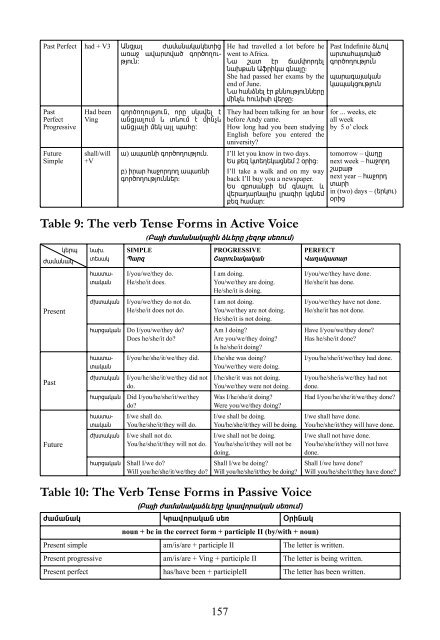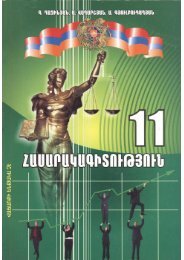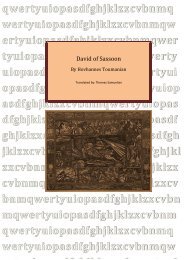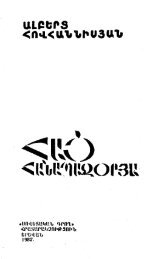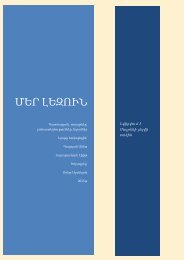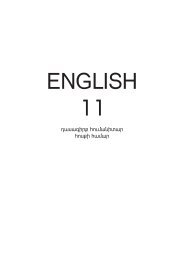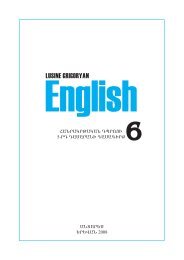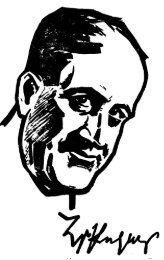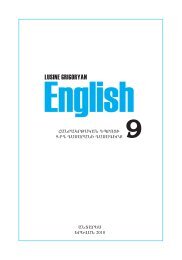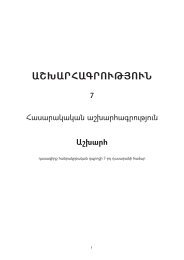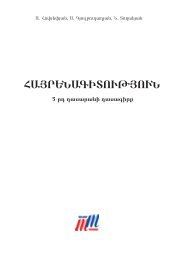Focus on Words
Focus on Words
Focus on Words
You also want an ePaper? Increase the reach of your titles
YUMPU automatically turns print PDFs into web optimized ePapers that Google loves.
Past<br />
Perfect<br />
Progressive<br />
Future<br />
Simple<br />
Had been<br />
Ving<br />
shall/will<br />
+V<br />
·áñÍáÕáõÃÛáõÝ, áñÁ ëÏëí»É ¿<br />
³ÝóÛ³ÉáõÙ ¨ ï¨áõÙ ¿ ÙÇÝã¨<br />
³ÝóÛ³ÉÇ Ù»Ï ³ÛÉ å³ÑÁ:<br />
ա) ապառնի գործողություն.<br />
բ) իրար հաջորդող ապառնի<br />
գործողություններ:<br />
He had travelled a lot before he<br />
went to Africa.<br />
Նա շատ էր ճամփորդել<br />
նախքան Աֆրիկա գնալը:<br />
She had passed her exams by the<br />
end of June.<br />
Նա հանձնել էր քննություն ները<br />
մինչև հունիսի վերջը:<br />
They had been talking for an hour<br />
before Andy came.<br />
How l<strong>on</strong>g had you been studying<br />
English before you entered the<br />
university?<br />
I’ll let you know in two days.<br />
Ես քեզ կտեղեկացնեմ 2 օրից:<br />
I’ll take a walk and <strong>on</strong> my way<br />
back I’ll buy you a newspaper.<br />
Ես զբոսանքի եմ գնալու և<br />
վերադարնալիս լրագիր կգնեմ<br />
քեզ համար:<br />
Table 9: The verb Tense Forms in Active Voice<br />
կերպ<br />
ժամանակ<br />
Present<br />
Past<br />
Future<br />
նախ.<br />
տեսակ<br />
ժխտական<br />
հարցական<br />
ժխտական<br />
հարցական<br />
Past Perfect had + V3 Անցյալ ժամանակակետից<br />
առաջ ավարտված գործողություն:<br />
հաստատական<br />
հաստատական<br />
հաստատական<br />
ժխտական<br />
հարցական<br />
SIMPLE<br />
Պարզ<br />
(Բայի ժամանակային ձևերը չեզոք սեռում)<br />
I/you/we/they do.<br />
He/she/it does.<br />
I/you/we/they do not do.<br />
He/she/it does not do.<br />
Do I/you/we/they do?<br />
Does he/she/it do?<br />
I/you/he/she/it/we/they did.<br />
I/you/he/she/it/we/they did not<br />
do.<br />
Did I/you/he/she/it/we/they<br />
do?<br />
I/we shall do.<br />
You/he/she/it/they will do.<br />
I/we shall not do.<br />
You/he/she/it/they will not do.<br />
Shall I/we do?<br />
Will you/he/she/it/we/they do?<br />
PROGRESSIVE<br />
Շարունակական<br />
I am doing.<br />
You/we/they are doing.<br />
He/she/it is doing.<br />
I am not doing.<br />
You/we/they are not doing.<br />
He/she/it is not doing.<br />
Am I doing?<br />
Are you/we/they doing?<br />
Is he/she/it doing?<br />
I/he/she was doing?<br />
You/we/they were doing.<br />
I/he/she/it was not doing.<br />
You/we/they were not doing.<br />
Was I/he/she/it doing?<br />
Were you/we/they doing?<br />
I/we shall be doing.<br />
You/he/she/it/they will be doing.<br />
I/we shall not be doing.<br />
You/he/she/it/they will not be<br />
doing.<br />
Shall I/we be doing?<br />
Will you/he/she/it/they be doing?<br />
Table 10: The Verb Tense Forms in Passive Voice<br />
PERFECT<br />
Վաղակատար<br />
Past Indefinite ձևով<br />
արտահայտված<br />
գործողություն<br />
պարագայական<br />
կապակցություն<br />
for ... weeks, etc<br />
all week<br />
by 5 o’ clock<br />
tomorrow – վաղը<br />
next week – հաջորդ<br />
շաբաթ<br />
next year – հաջորդ<br />
տարի<br />
in (two) days – (երկու)<br />
օրից<br />
I/you/we/they have d<strong>on</strong>e.<br />
He/she/it has d<strong>on</strong>e.<br />
I/you/we/they have not d<strong>on</strong>e.<br />
He/she/it has not d<strong>on</strong>e.<br />
Have I/you/we/they d<strong>on</strong>e?<br />
Has he/she/it d<strong>on</strong>e?<br />
I/you/he/she/it/we/they had d<strong>on</strong>e.<br />
I/you/he/she/is/we/they had not<br />
d<strong>on</strong>e.<br />
Had I/you/he/she/it/we/they d<strong>on</strong>e?<br />
I/we shall have d<strong>on</strong>e.<br />
You/he/she/it/they will have d<strong>on</strong>e.<br />
I/we shall not have d<strong>on</strong>e.<br />
You/he/she/it/they will not have<br />
d<strong>on</strong>e.<br />
Shall I/we have d<strong>on</strong>e?<br />
Will you/he/she/it/they have d<strong>on</strong>e?<br />
(Բայի ժամանակաձևերը կրավորական սեռում)<br />
Å³Ù³Ý³Ï Îñ³íáñ³Ï³Ý ë»é úñÇݳÏ<br />
noun + be in the correct form + participle II (by/with + noun)<br />
Present simple am/is/are + participle II The letter is written.<br />
Present progressive am/is/are + Ving + participle II The letter is being written.<br />
Present perfect has/have been + participleII The letter has been written.<br />
157


